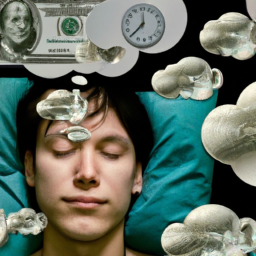Hey dreamers, have you ever experienced waking up from a dream feeling angry? Whether it was being chased or fighting with a loved one, angry dreams can leave us feeling uneasy and frustrated even after waking up.
But have you ever wondered what these dreams might mean? I am here to explore the fascinating world of dream interpretation and provide insight into the meaning behind angry dreams.
Dreams have been studied and analyzed for centuries, with different cultures and individuals interpreting them in unique ways. While some believe dreams are a reflection of our subconscious thoughts and feelings, others see them as a way to connect with a greater spiritual realm.
No matter how you view them, dreams can provide valuable insight into our emotions and experiences. So, let’s dive deeper into the world of angry dreams and discover what they might be trying to tell us.
Key Takeaways
- Angry dreams are a reflection of our emotions and experiences from waking life.
- Paying attention to angry dreams can provide valuable insight into our subconscious thoughts and feelings.
- Relaxation techniques and keeping a dream journal can help manage and identify patterns in angry dreams.
- Talking to a therapist can be helpful in exploring underlying causes of anger and providing tools to manage emotions.
Overview of Dream Meanings
Dreams can be mysterious and complex, but understanding the basic overview of dream meanings can provide insight into the subconscious mind’s inner workings.
Dreams are often a reflection of our thoughts, emotions, and experiences from our waking life. They can be full of symbolism and metaphors, and can reveal hidden desires, fears, and anxieties that we may not be aware of in our conscious state.
One way to interpret dreams is through the use of a dream dictionary, which can provide insight into the meaning behind certain objects, situations, and people that appear in our dreams. However, it’s important to remember that dream interpretation is personal and subjective, and what may be true for one person may not be true for another.
With this in mind, understanding emotions in dreams can help us better understand ourselves and our innermost thoughts and feelings.
Understanding Emotions in Dreams
I find it fascinating how our emotions can manifest in our dreams.
In this subtopic, we’ll explore the common emotions that appear in dreams and how they can reveal unresolved feelings.
It’s interesting to see how our subconscious can use dreams as a way to process and express our emotions.
Common Emotions in Dreams
Feeling intense emotions like anger, fear, or sadness while sleeping is quite common. In fact, research suggests that most dreams are emotionally charged, with negative emotions being more prevalent than positive ones. These emotions can be so vivid that they can wake us up in the middle of the night, leaving us feeling troubled and confused.
When we experience intense emotions in our dreams, it’s often a reflection of how we’re feeling in our waking life. These emotions can reveal unresolved feelings, unprocessed experiences, or conflicts that we’ve been avoiding.
In the next section, we’ll explore how these emotions can give us valuable insights into our inner world and help us address our emotional wounds.
How Emotions Can Reveal Unresolved Feelings
You may not realize it, but the intense emotions you experience in your dreams can reveal unresolved feelings and conflicts that you’ve been avoiding in your waking life.
For instance, if you feel angry in a dream, it could indicate that you’ve repressed feelings of anger that you haven’t addressed. Similarly, if you feel sad in a dream, it could indicate that you have unresolved grief or sadness that you haven’t worked through.
By paying attention to your emotions in your dreams, you can gain valuable insights into your subconscious thoughts and feelings. This can help you identify areas in your life that you need to work on, such as improving communication with loved ones or addressing past traumas.
Now, let’s dive deeper into the different types of angry dreams and what they may signify.
Types of Angry Dreams
There are different types of angry dreams, such as those that feel like a tornado tearing through your thoughts, leaving destruction in its wake. These dreams can be intense and often leave you feeling unsettled when you wake up. Other types of angry dreams may involve a confrontation with someone or a situation that makes you angry. These dreams can serve as a way for your subconscious to process unresolved emotions and help you come to terms with them.
To better understand the different types of angry dreams, I’ve created a table below that outlines some common themes and interpretations. It’s important to note that while these interpretations may be helpful, ultimately the meaning of your dream will be unique to your own experiences and emotions. In the next section, I’ll discuss how to interpret symbols in dreams to gain a deeper understanding of their personal significance.
| Type of Angry Dream | Theme | Interpretation |
|---|---|---|
| Tornado | Destruction, chaos | Unresolved emotions causing turmoil |
| Confrontation | Anger, frustration | Need to assert oneself or confront a situation |
| Attack | Vulnerability, fear | Feeling attacked or threatened in waking life |
| Revenge | Retaliation, vindictiveness | Desire for justice or retribution |
| Betrayal | Disloyalty, hurt | Feeling betrayed or let down by someone |
| Out of Control | Helplessness, loss of control | Difficulty managing emotions or situations |
Now that we’ve explored the different types of angry dreams, let’s look at how to interpret symbols in dreams to gain a deeper understanding of their personal significance.
Interpreting Symbols in Dreams
Get ready to dive deeper into the hidden meanings of your dreams by interpreting the symbols that appear throughout them. Dreams are often filled with symbols that can be difficult to decipher, but they hold important clues to understanding the messages your subconscious is trying to send you.
These symbols can range from objects to animals to people, and they often represent deeper emotions or situations in your waking life. For example, dreaming about a snake could represent fear or danger, while dreaming about a bird could represent freedom or a desire for escape.
It’s important to pay attention to the context of the symbol as well, as the same symbol can have different meanings depending on the circumstances. By understanding the symbols in your dreams, you can start to unravel the underlying emotions and experiences that are causing your anger to manifest in your sleep.
This can then lead to identifying triggers for angry dreams, such as unresolved conflicts or stressors in your daily life. By addressing these underlying issues, you can work towards a more peaceful and restful sleep, and a healthier emotional state overall.
Identifying Triggers for Angry Dreams
Ah, identifying the culprits behind those nighttime bouts of rage is as tricky as catching a fly with chopsticks. Sometimes it’s easy to pinpoint the trigger of an angry dream, like when I dream about arguing with a friend after a heated argument in real life. Other times, it’s not so clear. That’s when I find it helpful to reflect on my day and consider any potential stressors or unresolved conflicts that may have seeped into my subconscious.
To make this process easier, I like to use a table to jot down possible triggers for my angry dreams. Here’s an example:
| Trigger | Explanation |
|---|---|
| Work stress | A tough deadline or difficult coworker |
| Relationship issues | Arguments with my partner or family |
| Physical discomfort | Pain or discomfort in my body |
By identifying these potential triggers, I can take steps to address them in my waking life and hopefully reduce the frequency of angry dreams. But what do I do when I still find myself waking up in a fury? That’s where coping strategies for dealing with angry dreams come in.
Coping Strategies for Dealing with Angry Dreams
To cope with those frustrating nighttime fits of fury, I’ve found some effective strategies that have helped me deal with angry dreams. Here are a few things that have worked for me:
-
Practice relaxation techniques before bed: This can include deep breathing exercises, meditation, or yoga. By calming your mind and body before sleep, you may be less likely to have intense and angry dreams.
-
Keep a dream journal: Writing down your dreams can help you identify patterns and triggers that may be causing your angry dreams. You can also use your journal to reflect on your emotions and thoughts surrounding the dream, which may help you process and release any negative feelings.
-
Talk to a therapist: If your angry dreams are causing significant distress or interfering with your daily life, it may be helpful to seek professional support. A therapist can help you explore underlying causes of your anger and provide tools to manage your emotions.
-
Create a positive sleep environment: Make sure your sleep environment is comfortable, cool, and dark. You may also want to incorporate calming scents or sounds, such as lavender or white noise, to help promote restful sleep.
By using these coping strategies, I’ve been able to better manage my angry dreams and reduce their frequency. However, it’s important to remember that negative emotions can also provide an opportunity for growth and transformation.
In the next section, we’ll discuss how to use these emotions to inspire positive change in our lives.
Transforming Negative Emotions into Positive Growth
I’ve found that my dreams often reflect my subconscious emotions and experiences, and can offer valuable insights into my inner world.
When I have negative dreams, I try to approach them with curiosity and openness, rather than fear or resistance.
By exploring the symbols and themes in my dreams, I can often uncover deeper meanings and gain a greater understanding of myself and my life.
Learning from Dreams
You can gain valuable insights by paying attention to your dreams, especially when it comes to learning from them. Here are three ways I’ve found to be helpful in interpreting my dreams:
-
Keep a dream journal: Writing down your dreams as soon as you wake up can help you remember details that may be significant. It can also help you notice patterns or recurring themes in your dreams over time.
-
Look for symbolism: Dreams often use symbols to convey meaning. For example, dreaming about water can represent emotions or the subconscious mind. Pay attention to what these symbols mean to you personally, as they may have different meanings for different people.
-
Consider your emotions: How you feel in a dream can be just as important as what happens. Take note of any strong emotions you experience, such as fear or anger, and try to identify what may be causing them.
By analyzing your dreams in these ways, you can gain a deeper understanding of your subconscious mind and potentially uncover insights about yourself that can lead to personal growth.
In the next section, we’ll explore how to find meaning in dream symbols.
Finding Meaning in Dream Symbols
Uncovering the hidden messages in your dreams can be an exhilarating and eye-opening experience, especially when it comes to deciphering the symbolic language that your subconscious mind uses to communicate with you.
Dreams are often filled with symbols that carry deep meanings, and it’s up to us to interpret them correctly to gain insight into our lives.
For example, seeing a snake in a dream could represent transformation or rebirth, while a spider could symbolize creativity or feminine energy.
However, it’s important to remember that dream symbols can vary greatly depending on culture and individual experiences.
For instance, in some cultures, the color black may represent death, while in others it may signify power or sophistication.
Similarly, an individual’s personal experiences may influence the meanings they attach to certain symbols in their dreams.
By considering the cultural and personal contexts in which a dream occurs, we can gain a more comprehensive understanding of its meaning and unlock its full potential for personal growth.
The Role of Culture and Individual Experiences in Dream Interpretation
Cultural beliefs and individual experiences heavily influence how we interpret our dreams, as seen in the story of a woman who dreamt of being chased by a black cat, which was seen as a bad omen in her culture. In Western cultures, however, a black cat may be associated with Halloween or bad luck, but not necessarily with a sinister meaning in dreams. This highlights the importance of understanding the cultural background and personal experiences of the dreamer when interpreting dreams.
To further illustrate this point, here are three examples of how culture and individual experiences can shape dream interpretation:
1) In some cultures, snakes are revered as symbols of wisdom and healing, while in others they may represent danger and fear.
2) Personal experiences, such as a traumatic event or a recent breakup, can influence the content and emotions in dreams.
3) Religious and spiritual beliefs can also impact dream interpretation, as symbols or figures from one’s faith may appear in dreams and hold significant meaning for the dreamer.
Understanding these cultural and personal factors can lead to a more accurate interpretation of dream symbols and emotions.
Moving on to the next section about debunking common myths about dreams, it’s important to approach dream interpretation with an open mind and a willingness to explore the many possible meanings and influences.
Debunking Common Myths About Dreams
Don’t believe everything you hear about dreams, as there are many common myths that can lead to misinterpretation and misunderstanding.
For example, many people believe that if you die in a dream, you will die in real life. This is simply not true. Dreams are a product of our subconscious mind, and while they may feel real, they are not a reflection of reality.
Similarly, some people think that dreams predict the future or offer insight into our destiny. While dreams can certainly reveal our deepest desires and fears, they are not a crystal ball that can predict the future.
Another common myth is that everyone dreams in color. In fact, up until the 1950s, it was thought that all dreams were in black and white. While it is true that some people dream in vivid color, others may dream in shades of gray or in monochrome.
In addition, many people believe that dreams are random and meaningless. However, research has shown that dreams often reflect our waking life experiences and emotions, and can provide valuable insight into our subconscious mind.
By debunking these common myths about dreams, we can begin to better understand and interpret the messages our subconscious mind is sending us.
Frequently Asked Questions
How do I stop having angry dreams altogether?
To stop having angry dreams, I focus on positive symbols like a sunny beach or a peaceful forest. I also try to avoid watching violent media before bed and practice relaxation techniques like deep breathing and meditation.
Can dreams be a reflection of repressed anger in waking life?
Yes, dreams can reveal repressed anger in our waking life. Unresolved emotions can manifest in our dreams, providing a safe space to process them. Exploring and addressing these feelings can lead to a more peaceful sleep.
Are there any medications that can help prevent or reduce angry dreams?
Coincidentally, I recently asked my doctor about medications for reducing angry dreams. She suggested trying low-dose antidepressants or anti-anxiety meds. However, it’s important to discuss with a medical professional before starting any medication.
Can talking to a therapist or counselor help with recurring angry dreams?
Talking to a therapist or counselor can help me understand and address the underlying emotions that are causing my recurring angry dreams. With their guidance, I can learn coping strategies and work towards resolving any unresolved issues.
Can certain foods or activities before bed contribute to angry dreams?
Yes, certain foods and activities can contribute to angry dreams. Eating heavy meals, consuming alcohol or caffeine, or watching violent shows before bed can increase the likelihood of experiencing angry dreams.
Conclusion
So, what do angry dreams mean? As I’ve explored in this article, dreams are complex and can be influenced by a variety of factors, including our emotions, experiences, and cultural background.
While anger in dreams can be unsettling, it’s important to remember that it’s a natural and healthy emotion that we all experience. Instead of ignoring or suppressing our anger, we can use our angry dreams as an opportunity to explore and understand our underlying emotions.
By identifying our triggers and using coping strategies, we can transform negative emotions into positive growth. Just like a seed needs to be planted in order to grow into a beautiful flower, our emotions need to be acknowledged and processed in order for us to thrive.
In the end, our dreams can serve as a powerful tool for self-discovery and healing.









